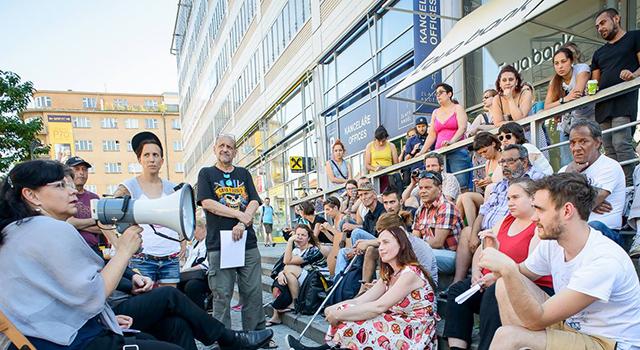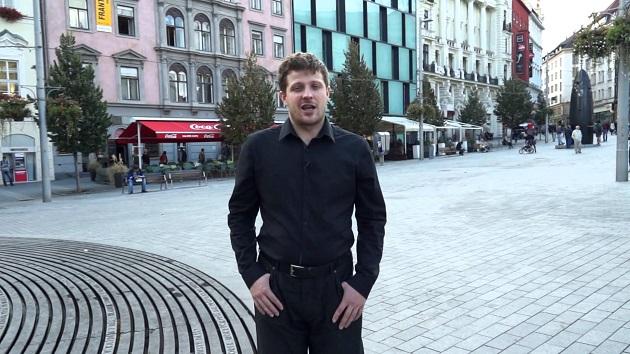Czech Labor and Social Affairs Minister meets with homeless people

On 23 June an active group of homeless people from three Czech cities met in Prague with Czech Labor and Social Affairs Minister Michaela Marksová and a representative of the Regional Development Ministry, Housing Policy Department Director Jiří Klíma. Roughly 40 people gathered to discuss the planned law on social housing.
The meeting included free food provided by a group of homeless cooks called “Just Like Home” (Jako doma) and a music performance. It was the biggest meeting of its kind in the history of the Czech Republic.
The Government representatives expressed their support for a social housing law. “Our ministry considers – and I personally consider – this law to be an enormous priority because it seems crazy to me that the Czech Republic does not have one already. There are not many countries in Europe without one. I consider this a terribly important matter for which I am already fighting now and for which I will continue to fight in the future. That I can actually promise you,” the Labor and Social Affairs Minister said.
The meeting was held outdoors near the Anděl metro station in Prague and was organized by three groups of people in need of housing from the three largest cities in the Czech Republic (Prague, Brno and Ostrava) who symbolically called it a meeting at a “round sidewalk” instead of a round table, because those without a roof over their heads also lack tables. Representatives of the active groups formulated several points to deliver about what bothers them in their communities and described their intractable situations.
The homeless representatives drew attention to the constantly growing number of homeless people, the arbitrary nature of the support provided by municipalities to support housing the homeless, the trafficking in poverty that is underway, the stigmatization and uncertainty they experience, and the undignified nature of accommodation in facilities like residential hotels where, for example, one toilet is shared by more than 100 people. Both Government representatives said they support the social housing law and that the disputes between their ministries over which ministry would have competence for what had been resolved at a ministerial-level meeting on 22 June.
Both of the Government representatives expressed optimism that the Government will adopt the social housing law. Minister Marksová also mentioned the role of municipalities: “Already today those municipalities that want to take care of their inhabitants and that have what, in my opinion, is the very justified feeling that they should take care of their inhabitants – they already have social housing systems in place. The problem is that some municipalities do not want to do this. We are basically instituting this law because of them, so they will have to take care of their inhabitants. If you end up in a municipality that has the feeling it does not have to take care of you when you have problems with housing, that is very bad.”
The active groups of homeless people concluded the meeting by presenting their demands and proposing that the issues be included in the ongoing discussion of this issue – as they have written, experience has taught them that their interests very often clash with those of some of the actors formulating social housing policy. They are therefore primarily demanding accessible, dignified, financially affordable housing for all.
The homeless are calling for the provision of apartments, not residential hotels. They are also calling for the abolition of rent deposits or for the provision of ways to finance them for those who cannot afford them.
Another demand is that the apartments provided meet building and health codes. They also do not want apartments to be segregated in “ghettos”.
Those meeting with the minister said landlords’ discrimination against prospective tenants on various grounds, which renders housing inaccessible, must be addressed. They also called for support for social workers instead of support for repressive checks of homeless people.
The groups involved are called “We Want Housing” (Chceme bydlet – Prague), “Movement for New Housing” (Hnutí za nové bydlení – Brno) and “Circle of Hope” (Kruh naděje – Ostrava). Their work is a unique example of how to form social policies so that the people who will be most affected by a law are capable of formulating their priorities and organizing themselves to present them to legislators.
The Labor and Social Affairs Ministry was open to their input. “We are convinced that when formulating social policies, all key parties should be regularly invited to consultations on them, i.e., besides municipalities and owners of apartment buildings, the potential tenants of social apartments should be included as well. The ability to formulate their priorities and the activity demonstrated by these three groups of homeless people promises that the legislation designed with their input will actually work,” said Vít Lesák, director of the Platform for Social Housing.
